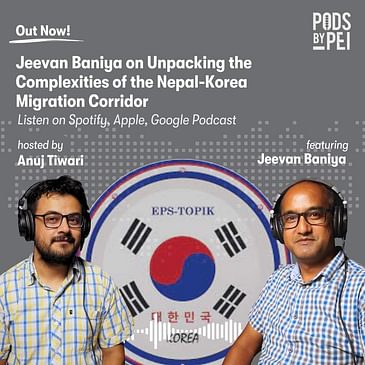#Ep.055
Foreign employment from Nepal to South Korea has emerged as a prominent and distinct migration corridor in recent years. It gained popularity as an attractive destination for Nepali migrant workers due to the government’s formal agreement under the Korea Employment Permit System (EPS), which allows for legal work opportunities in various sectors, primarily in manufacturing, agriculture, and construction. EPS has facilitated a structured and regulated process for recruitment, ensuring a level of protection for Nepali workers. However, challenges such as pre-departure costs, language barriers, cultural adjustments, and occasional controversies related to re-entry have also been part of this migration experience, making it demand attention and policy considerations.
In this episode, PEI colleague Anuj Tiwari sits with Jeevan Baniya to discuss the Nepal-Korea Migration corridor. The two draw from Baniya’s recent paper titled "Only a few can afford to go to Korea: The Costs of Nepali Migration to South Korea." to explore the pre-migration phase of the Nepal-Korea Migration. They explore the unique characteristics of migration to Korea from the perspective of aspirations and capabilities to understand the emigrants, their motivation to move, and avenues to facilitate the movement, along with problems and vulnerabilities that arise.
Jeevan Baniya is the Assistant Director of the Centre for the Study of Labour and Mobility at Social Science Baha. He has provided advisory and technical support to multiple national and international organizations, including the Ministry for Labour, Employment and Social Security, the National Human Rights Commission Nepal; the ILO; trade unions, and CSOs.
If you liked the episode, hear more from us through our free newsletter services, PEI Substack: Of Policies and Politics, and click here to support us on Patreon!!
<quillbot-extension-portal></quillbot-extension-portal>
<quillbot-extension-portal></quillbot-extension-portal>
<quillbot-extension-portal></quillbot-extension-portal>


